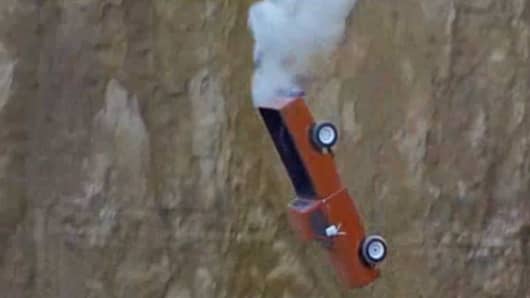Ethan Harris, a well-respected economist for Bank of America Merrill Lynch, sounds very afraid when he talks about the "increasingly popular view" that going over the "Fiscal Cliff" this year will do minimal damage to the economy and make possible a better deal next year.
"One of the most dangerous ideas circulating in Washington is that it is okay to go over the cliff temporarily," Harris said in his latest note to clients. "Threatening or actually going over the cliff will likely do serious damage to economic and market confidence. What some people are calling a 'bungee jump' could cause an economic heart attack."
Harris goes on to cite a New York Times piece that which plays down the effect no deal on Jan. 1 will have on the markets and the economy. The piece also suggests going over the cliff could be an effective negotiating ploy for the Democrats as Republicans will likely get the blame. (Read More: Some Analysts Doubt Dire Warnings About 'Cliff')
Republicans came back Monday with a formal counteroffer to the President Barack Obama's cliff compromise, but it was quickly rejected by the White House and Sen. Harry Reid for not addressing raising taxes on the wealthy. (Read More: GOP Offers Fiscal Cliff Plan)
"It will be exactly like what happened when TARP (the bank rescue plan) went before Congress in late 2008," said James Lebenthal of Lebenthal Asset Management. "The politicians puffed themselves up, voted it down, and the markets went straight down. Four days later they reconsidered and passed it."
The expiration of tax cuts and the automatic spending cuts encompassing the fiscal cliff will cost the economy $600 billion, according to the Congressional Budget Office. (Click Here for Complete Coverage of 'Fiscal Cliff')
Bank of America's Harris goes on in the note to lay out the flawed reasoning behind allowing the economy to go over the cliff, including the notion that the public will realize that the impasse is temporary and the fact that Treasury prices actually went higher after the debt ceiling fight last year triggered a debt downgrade.
His reasons for fearing this "bungee jump" strategy include a fight that drags on into 2013 further than people realize, causing companies to further curtail capital spending. He also cites the fact that the Republicans have some renewed leverage next year by threatening to let the debt ceiling expire.
"The fiscal cliff is just the latest manifestation of a trend toward using brinkmanship to reach decision rather than true bipartisan negotiations," said Harris. "Bungee jumping is a good experience for thrill-seekers, but not for the economy."
For the best market insight, catch 'Fast Money' each night at 5pm ET, and the 'Halftime Report' each afternoon at 12:00 ET on CNBC. Follow @CNBCMelloy on Twitter.



